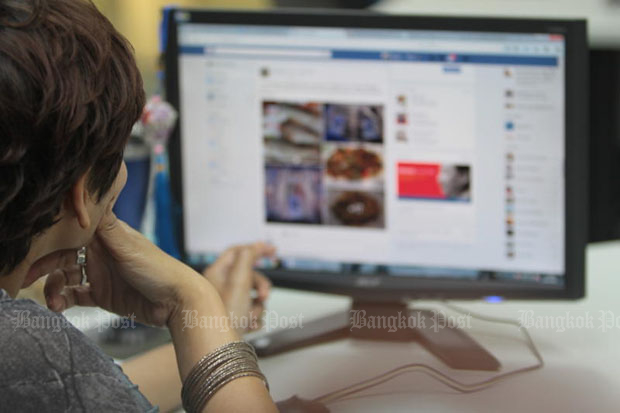
Authorities have given Facebook until Tuesday morning to remove 131 remaining posts by the Thai court order or face legal action.
The decision was made by the National Broadcasting and Telecommunications Commission (NBTC) and the Ministry of Digital Economy and Society (DE). The deadline was set at 10am, NBTC secretary-general Takorn Tantasith said on Thursday.
Last week, members of the Thai Internet Service Provider Association sent an email to Facebook chief executive Mark Zuckerberg asking his company to block the posts with content ruled illegal in Thailand including lese majeste. Facebook is the biggest social network in Thailand.
Representatives of Tispa, which is responsible for 95% of internet traffic in the country, told NBTC and DE on Thursday that Facebook removed 178 of 309 posts on the Criminal Court's blacklist. The remaining 131 posts were still accessible in Thailand and Facebook did not explain why.
Mr Takorn said DE would be the main agency to press charges if the deadline was not met since it is empowered to control illicit content on websites by using the Computer Crime Act.
The legal action would first be against Facebook Thailand and its partners, he said.
Dhiraphol Suwanprateep, partner for information technology and communications at the international law firm Baker & McKenzie Ltd, said if the government took legal action against Facebook Thailand for violating the Thai court order and the computer crime act, they had to make sure that Facebook Thailand was a full branch office of Facebook Inc.
"If Facebook Thailand was registered as a separate entity, it cannot be sued since it has no power to control illegal [Facebook] content," said Mr Dhiraphol.
The government may also find it hard to sue ISPs as they were not the ones who posted the illegal content.
"It can only press charges against the ISPs as supporters if it has proof they have ignored to remove the illegal content," said Mr Dhiraphol.
However, from the technical perspective, it is very hard for an ISP to know where those URLs or posts which contain illegal content are.
Normally, ISPs do not have control over data management. They are responsible for traffic flow, but they do not know the content in such traffic. They do not own the content and they are not responsible for uploading the content whether illegal or not.
"Forcing local ISPs to handle illegal content is not practical as they do not have the full capability to monitor and remove content. Under internationally recognised principles, ISPs are merely intermediaries and are exempted from charges in regard to illegal content under safe-harbour principles,” said Mr Dhirapol.
He added that censoring content was not a problem only in Thailand since it happens globally. If a government needs to block all illegal content, they will have to use the China model -- shutting down the entire Facebook service, which can block 80-90%. The question is whether they have an alternative for users, he said.
While China blocks Facebook, it has similar services, the most popular of which is Sina Weibo.
Mr Dhirapol said a government also can shut down caching or content delivery network (CDN) servers but this would drastically slow down the network traffic and create negative effect on users.